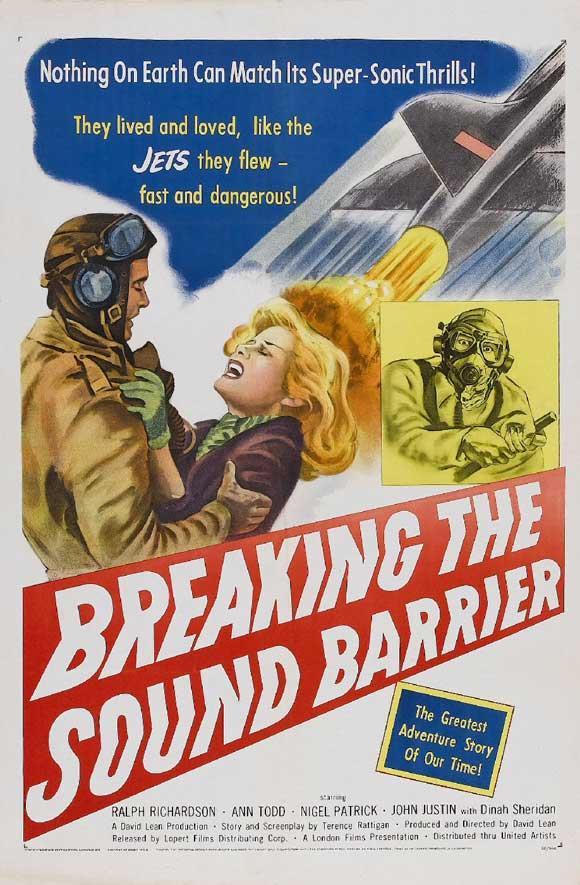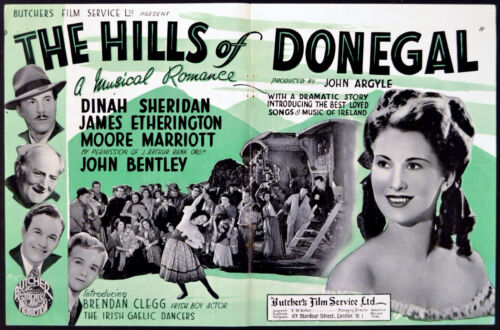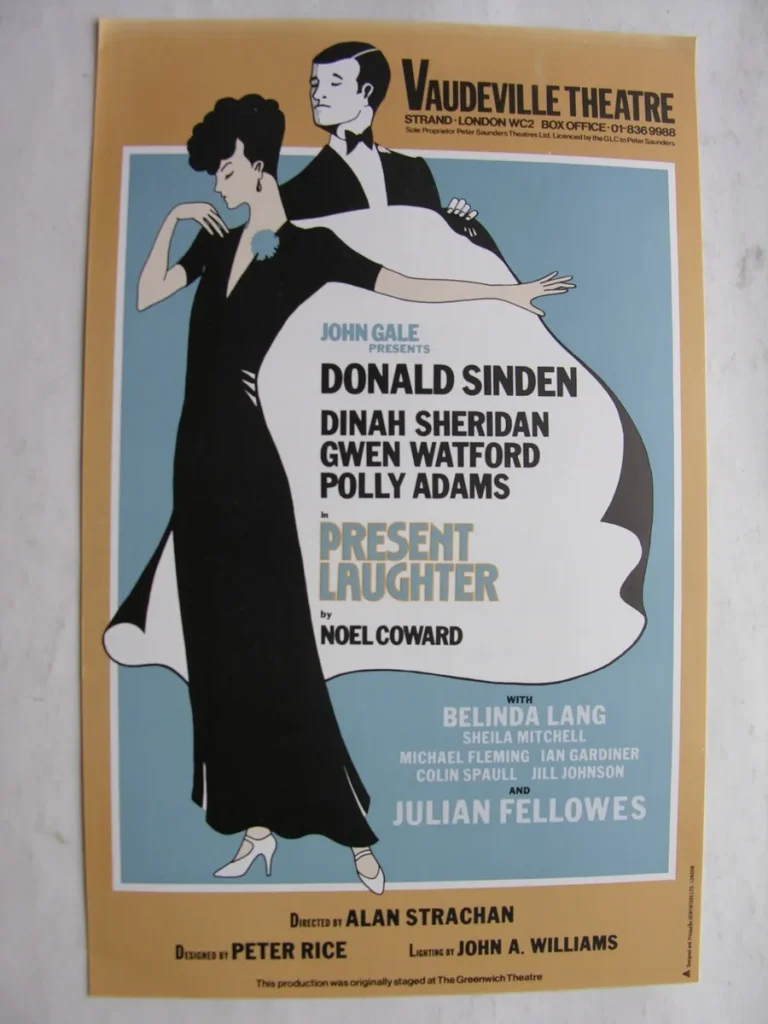

The Times obituary in 2012:
Dinah Sheridan played elegant, well-bred English women in many routine films before Genevieve allowed her to be funny and made her a star. With her career at its height she gave up acting to marry John Davis of the Rank Organisation, but returned in the 1960s, still elegant, as a character actress.
With her blonde hair and green eyes she was seen as the prototypical English rose, but she was the daughter of a Russian father and German mother who had settled in England after the First World War. Her parents were photographers talented enough to secure commissions from the Royal Family.
She was born in Hampstead in 1920 and her real name was Dinah Nadyejda Mec. After overcoming tuberculosis, which blighted her childhood, she trained at the Italia Conti stage school, picked the name Sheridan out of the telephone directory and made her stage debut in Where the Rainbow Ends at the Holborn Empire at the age of 12.
At 14 she played Wendy in Peter Pan, in a touring production with Jean Forbes-Robertson as Peter. Two years later she played Peter at the Shakespeare Memorial Theatre in Stratford and became the first actress to take the two roles. She later reverted to Wendy opposite Elsa Lanchester’s Peter and in 1940 recorded Wendy on disc for HMV.













She entered films while still a teenager in 1936 and six years later played George Formby’s girlfriend in the Home Guard spoof, Get Cracking (1943). Beryl, the star’s formidably protective wife, approved Sheridan’s casting after establishing that she was married. Beryl kept a close eye on a scene in which Sheridan, in modest pyjamas, lay on a bed with George hiding under it.
Her film career developed slowly and did not start to take off until well after the war. She appeared with her first husband, Jimmy Hanley, in For You Alone and 29 Acacia Avenue, and played Steve in two cinema spin-offs from Francis Durbridge’s radio series about the detective Paul Temple. But she rarely escaped from the mediocrity of second features.
That changed when she was cast as the gamekeeper’s wife, the only female character, in Where No Vultures Fly (1951), an Ealing Studios homage to the British Empire which was chosen for the Royal Film Performance. She had a supporting part in David Lean’s The Sound Barrier and played a WAAF who falls for Dirk Bogarde in the Second World War drama, Appointment in London.
She was second choice for the part after a pregnant Margaretta Scott dropped out and was second choice again, after Claire Bloom, for Genevieve (1953), on which she finally achieved top billing. A spirited comedy built around the London to Brighton veteran car run, it became one of the most popular films of the year and an enduring classic. Sheridan had a potentially unrewarding role as the bickering, put-upon wife of John Gregson, particularly when set against Kay Kendall’s flamboyant free spirit. But she played it to great effect, adding a flair for comic timing to her usual charm and poise. Although this did not show on the screen, the film was shot in bitterly cold weather which compelled Sheridan to wear several layers of clothing.
In the following year she announced that she was giving up her career to marry John Davis, the managing director of the Rank Organisation. He was 13 years older and had been married four times before. Her marriage to Jimmy Hanley had been dissolved in 1953. After Genevieve the film offers came pouring in, but, true to her agreement with Davis that she abandon acting on marriage, she instructed her agent to turn them all down.



At first she seemed content to fulfil the duties of an executive’s wife and to look after her two young children by Hanley, as well as Davis’s children from his previous marriages. But the relationship with Davis was a volatile one and they divorced on the ground of his cruelty in 1965. She later returned to court to apply, successfully, for an increase in her lump sum settlement to the then considerable sum of £25,000. This was on top of £8,500 a year maintenance.
The marriage over, she resumed her acting career, though this time more for stage and television than the cinema. Although apprehensive about returning to the stage after so many years away, she made her comeback in a comedy, Let’s All Go Down the Strand, in the distinguished company of Gladys Cooper, Hugh Williams and Evelyn Laye.
Also on the stage, she played opposite Tony Britton, who would later partner her on television, in A Boston Story and the comedy, Move Over, Mrs Markham, toured with John Gielgud in Julian Mitchell’s Half-Life and supported Donald Sinden’s Garry Essendine in Present Laughter. In 1986 she was on the London stage in a revival of Shaw’s The Apple Cart with Peter O’Toole.
In 1968 she returned to television for the first time since before the war in an ITV play, The Contact. Other television included Oscar Wilde’s An Ideal Husband and The Winning Streak, a family drama about the garage trade in Yorkshire. But her best-known role was the estranged wife of Dr Latimer (Tony Britton) in the BBC comedy, Don’t Wait Up, which also starred Nigel Havers as her also divorced doctor son.
Written by George Layton, and drawing on his own experience of divorce, Don’t Wait Up was an easygoing and immaculately performed show which ran for a number of series during the 1980s. Sheridan later had guest spots in TV series such as Keeping Up Appearances, Lovejoy and Jonathan Creek.
She gave an engaging performance as the mother in Lionel Jeffries’s affectionate version of The Railway Children (1970), her first film since Genevieve, but apart from joining the all-star cast on an Agatha Christie whodunnit, The Mirror Crack’d (1980), she was virtually neglected by the cinema thereafter.
Beautifully turned out and wearing her years lightly, in 1983 she was named as one of Britain’s five most sophisticated women by the London fashion house Butte Knit.
After her divorce from Davis, she had a long relationship with the actor Jack Merivale, nursing him through a kidney disease. After 18 years together they married in 1986. He died in 1990. Two years later she married her fourth husband, Aubrey Ison, an American businessman, and retired to California. She moved back to England after his death in 2007.
Her son, Jeremy Hanley, was elected a Conservative MP in 1983, became party chairman under John Major and was knighted. Her daughter, Jenny Hanley, was an actress


